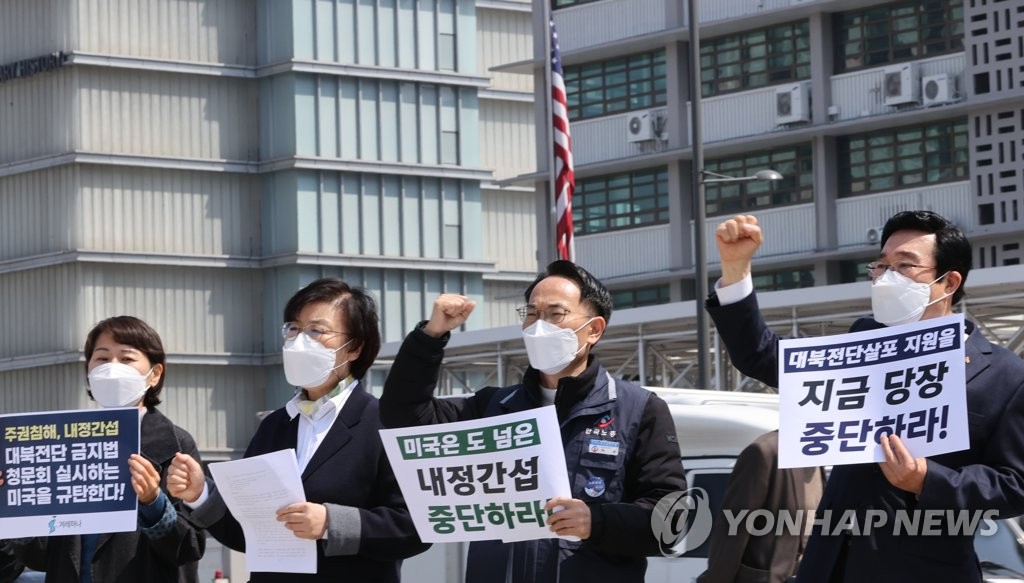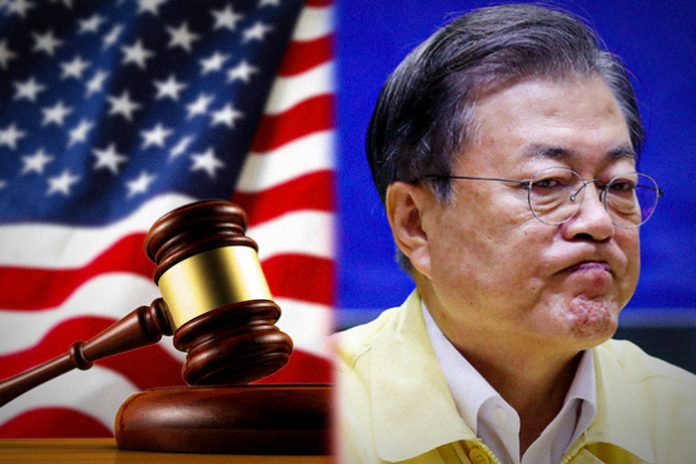The South Korean government had no official response to the latest public hearing held by a bipartisan caucus of the U.S. House of Representatives on human rights concerns in the Republic of Korea. During the hearing, several U.S. congressmen and witnesses expressed concern on several fronts, including the Moon administration’s controversial “anti-leaflet” law that went into effect last month.
“Personally, I hope the (ROK National) Assembly decides to fix the bill,” said Congressman James McGovern, who co-chairs the Tom Lantos Human Rights Commission. “Again, that’s the advantage of living in a democracy. There’s always a chance for a redo. International human rights law provides guidance on what is and is not acceptable when it comes to restricting freedom of expression for security reasons. If the assembly does revisit the law, I would encourage legislators to take that, that guidance into account.”
Congressman Chris Smith, who is also co-chair of the commission, said: “I believed then and I believe now that this law currently under review by the Korean Constitutional Court unduly infringes upon freedom of expression under both the Korean constitution and the International Covenant on Civil and Political Rights.”
South Korea’s Ministry of Foreign Affairs told local media that they are aware of the hearing, but said it would not comment on what individuals discussed. Regarding Congressman McGovern’s comment that South Korea should fix the controversial law, the foreign ministry said that “it is something for the Republic of Korea’s National Assembly to decide.” The ministry repeated its previous stance that the “anti-leaflet” law is necessary.
The so-called “anti-leaflet law” refers to the revision of the Development of Inter-Korean Relations Act which was passed in December last year and went into effect on March 30th this year. The bill makes it a crime punishable by up to three years in prison or by a fine not exceeding 30 million won ($26,761) to send pamphlets and storage devices such as flash drives, money, and other financial benefits to the North without the South Korean government’s permission.
“The Development of Inter-Korean Relations Act was amended to protect the life and safety of people residing near the border with North Korea,” the foreign ministry said. “We will continue to implement the law by trying to follow the amended parts. We will also continue to work hard on improving North Korean human rights, including the North Korean people’s right to be informed.”
According to the South Korean media, the foreign ministry did not release an official statement on the congressional hearing. The ministry only provided comments to reporters who asked for them. The media interpreted this as an effort by the government to minimize the impact from the hearing by giving it as little attention as possible.
When asked about the hearing during the press briefing held on April 16, Cha Deok-choel, a deputy spokesperson at South Korea’s Unification Ministry, said the government will implement the law as it was amended. Before the hearing, the same spokesperson argued that “the Tom Lantos Commission does not have the authority to make a legislative decision, and it is more like a policy study group.” This comment provoked a response in the United States and some congressmen, who in fact do have legislative power, even took exception to the remarks during the hearing.
Even though the government is trying not to attach much meaning to it, some political figures who are part of the pro-Moon Jae-in faction and civic groups expressed their discomfort with the hearing.
“How does the National Assembly’s legislation to protect people’s safety in a sovereign state become an agenda in another country’s public hearing?” said Yoon Geon-young, a lawmaker from the ruling Democratic Party. He was the chief of state affairs at the Blue House under the Moon Jae-in administration. He was also one of the key members who led negotiations ahead of the inter-Korean summit in April 2018.
“I doubt whether the hearing proceeded fairly,” Yoon argued. “Two-third, or four, out of six witnesses were people who have been opposed to banning leaflets sent to North Korea. There was even someone who supported sending leaflets personally. Suzanne Scholte, vice Co-Chair of the U.S. Committee for Human Rights in North Korea, held numerous press briefings with Mr. Park Sang-hak. She can be considered someone directly involved in sending leaflets. Can they be objective witnesses?” Park Sang-hak is a North Korean defector who has been leading the leaflet movement in South Korea.
Yoon’s argument continues as follows.
“Among witnesses, there are even people who criticized the Moon Jae-in administration’s Korean peninsula peace process even before the National Assembly amended the anti-leaflet law. Ambassador Lee In-ho said ‘The Moon Jae-in administration is like an airplane pilot who hijacked citizens (October 12, 2018)’ and lawyer Gordon Chang wrote in on his Twitter account that ‘#moonJaein could be a #NorthKorea agent.’”
Yoon repeated a previous argument made by the unification ministry. “The Tom Lantos Human Rights Commission is a kind of caucus similar to a forum between congressmen, and it does not have legislative power such as processing a bill or resolution.”

A South Korean civic group known as: Southern Part of the Commission of the June 15th North-South Joint Declaration Implementation, that focuses on various inter-Korean related issues, protested in front of the U.S. embassy in Seoul on April 15th. The group’s members used slogans such as “The United States should stop interfering in domestic affairs,” “The United States should stop arguing the pros and cons of the anti-leaflet law and take care of their own business,” “Stop the infringement of sovereignty,” and “Stop the leaflets.”
They argued that there is a serious problem with the U.S. State Department’s latest statement. A spokesperson from the State Department gave the Voice of America a statement on April 13th saying, “We respect the fact that the ROK, as a democracy with an independent and strong judiciary, has tools in place to allow for review of the law.” This statement was in reference to former Unification Minister Jeong Se-hyun’s comment that decried the hearing as “some kind of interference in domestic affairs.” (https://onekoreanetwork.com/2021/04/15/south-koreas-leaflet-law-and-deportation-of-fisherman-emblematic-of-moon-administrations-human-rights-issues/)
The civic group also complained: “the US Congress mentioned not only our National Assembly but also the judicial branch, and it is an infringement of sovereignty and interference in domestic affairs that exceeded the limit,” the organization said. “The anti-leaflet law is a part of implementing inter-Korean agreements, and this hearing is both interrupting and disrupting inter-Korea relations.”
After the hearing, most of the major newspapers in South Korea ran editorials criticizing the anti-leaflet law and calling for the law to be repealed.
The Chosun Ilbo newspaper’s editorial on April 17th was titled “Hearing held in the United States exposed concerns over South Korea’s democracy-it has returned to the military regime’s era.” The editorial concluded with the following statement.
“The U.S. Congress is showing worries over South Korea’s democracy and the South Korean government is reacting against it as interference with domestic affairs. This is something that occurred during the military regime’s era in the 1970s and 1980s. We never imagined seeing this kind of thing happening again decades later under a South Korean government who brag about democratization as if it is their order of merit.”
The DongA Ilbo newspaper’s editorial was titled “The U.S. anti-leaflet law hearing that embarrassed us for being South Koreans.” The following is an excerpt from the conclusion of the editorial.
“The Ministry of Unification repeated its stance that the law is to protect the life and safety of people residing near the border. This is the government that decried the hearing by saying that the commission is like a policy study group that does not have the authority to make a legislative decision. This kind of stance could cause conflict with the Joe Biden administration, which puts emphasis on universal values like democracy and human rights. The United States will lay out its new policy toward North Korea soon and the summit between Seoul and Washington is scheduled for next month. It feels stifling to think about how long we have to see this government’s submissive attitude toward North Korea, which hurts the South Korean people’s pride.”
The JoongAng Sunday, the JoongAng Ilbo’s weekend edition, ran an editorial titled “Anti-leaflet law discussed in the U.S. hearing should be repealed.”
“The hearing clearly showed that the anti-leaflet law is a key concern of not only the U.S. Congress but also the Biden administration. Thus, the South Korean government should respond to it cleverly after going over the implication of the issue thoroughly. If the government ignores the alarm and insists on ‘My Way,’ we cannot rule out a worst-case scenario where a resolution denouncing South Korean human rights issues might get passed in the U.S. Congress. Thus, it is urgent to meet global standards when it comes to human rights, at least. The government should discuss ways to efficiently protect people’s safety in the border area, but the anti-leaflet law that goes against the constitution and the universal values of mankind should be repealed.”
The Hankyoreh Shinmun and Kyunghyang Shinmun, which are considered more liberal than other newspapers, did not have any editorials covering the aftermath of the hearing on their websites as of April 17.


